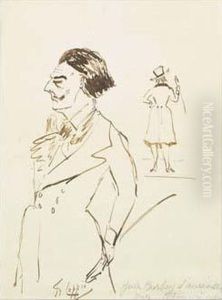Francois Coppee Paintings
François Coppée was a French poet and novelist, born on January 26, 1842, in Paris, France. He was a leading figure in the French literary scene of the late 19th century, known for his simple, sentimental style that appealed to the tastes of the bourgeois audience of his time. Coppée's work is characterized by its focus on themes of love, patriotism, and the beauty of everyday life, as well as its sympathy for the underprivileged classes. His poetry and prose reflect the influence of the Romantic movement, yet they also signal a transition towards more realistic depictions of social issues.
Coppée's early career was marked by his employment in the French civil service, but his passion for literature led him to pursue writing full-time. He gained initial fame with the publication of his poetry collection 'Le Reliquaire' in 1866, which established him as a prominent voice among the Parnassian poets, a group that advocated for art for art's sake and emphasized formal precision and emotional detachment. However, Coppée's work often diverged from these principles, displaying a warmth and empathy that resonated with a wide audience.
Throughout his career, Coppée produced a significant body of work, including plays, short stories, novels, and poetry. His plays, such as 'Le Passant' (1869) and 'Fais ce que dois' (1871), were particularly successful, celebrated for their lyrical quality and emotional depth. Coppée also engaged in public life, serving as a librarian for the French Senate and participating in various literary circles. He was elected to the Académie Française in 1884, a testament to his esteemed position in French letters.
Despite his popularity, Coppée's later years were marked by personal struggles, including a battle with depression and a controversial turn towards nationalist and anti-Semitic views, which have since tarnished his legacy. He died on May 23, 1908, in Paris. Today, François Coppée is remembered as a complex figure in French literature, whose work offers insight into the societal tensions and cultural shifts of his time.

